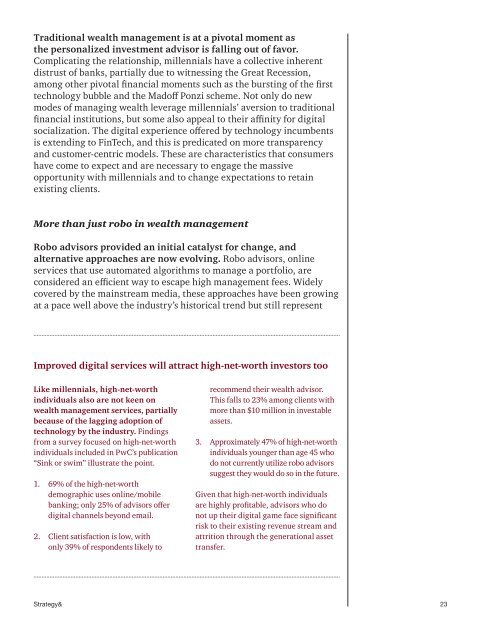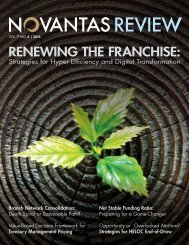The un(der)banked is FinTech’s largest opportunity
DeNovo-Quarterly-Q2-2016.pdf?utm_content=buffer9dd60&utm_medium=social&utm_source=twitter
DeNovo-Quarterly-Q2-2016.pdf?utm_content=buffer9dd60&utm_medium=social&utm_source=twitter
You also want an ePaper? Increase the reach of your titles
YUMPU automatically turns print PDFs into web optimized ePapers that Google loves.
Traditional wealth management <strong>is</strong> at a pivotal moment as<br />
the personalized investment adv<strong>is</strong>or <strong>is</strong> falling out of favor.<br />
Complicating the relationship, millennials have a collective inherent<br />
d<strong>is</strong>trust of banks, partially due to witnessing the Great Recession,<br />
among other pivotal financial moments such as the bursting of the first<br />
technology bubble and the Madoff Ponzi scheme. Not only do new<br />
modes of managing wealth leverage millennials’ aversion to traditional<br />
financial institutions, but some also appeal to their affinity for digital<br />
socialization. <strong>The</strong> digital experience offered by technology incumbents<br />
<strong>is</strong> extending to FinTech, and th<strong>is</strong> <strong>is</strong> predicated on more transparency<br />
and customer-centric models. <strong>The</strong>se are character<strong>is</strong>tics that consumers<br />
have come to expect and are necessary to engage the massive<br />
opport<strong>un</strong>ity with millennials and to change expectations to retain<br />
ex<strong>is</strong>ting clients.<br />
More than just robo in wealth management<br />
Robo adv<strong>is</strong>ors provided an initial catalyst for change, and<br />
alternative approaches are now evolving. Robo adv<strong>is</strong>ors, online<br />
services that use automated algorithms to manage a portfolio, are<br />
consi<strong>der</strong>ed an efficient way to escape high management fees. Widely<br />
covered by the mainstream media, these approaches have been growing<br />
at a pace well above the industry’s h<strong>is</strong>torical trend but still represent<br />
Improved digital services will attract high-net-worth investors too<br />
Like millennials, high-net-worth<br />
individuals also are not keen on<br />
wealth management services, partially<br />
because of the lagging adoption of<br />
technology by the industry. Findings<br />
from a survey focused on high-net-worth<br />
individuals included in PwC’s publication<br />
“Sink or swim” illustrate the point.<br />
1. 69% of the high-net-worth<br />
demographic uses online/mobile<br />
banking; only 25% of adv<strong>is</strong>ors offer<br />
digital channels beyond email.<br />
2. Client sat<strong>is</strong>faction <strong>is</strong> low, with<br />
only 39% of respondents likely to<br />
recommend their wealth adv<strong>is</strong>or.<br />
Th<strong>is</strong> falls to 23% among clients with<br />
more than $10 million in investable<br />
assets.<br />
3. Approximately 47% of high-net-worth<br />
individuals yo<strong>un</strong>ger than age 45 who<br />
do not currently utilize robo adv<strong>is</strong>ors<br />
suggest they would do so in the future.<br />
Given that high-net-worth individuals<br />
are highly profitable, adv<strong>is</strong>ors who do<br />
not up their digital game face significant<br />
r<strong>is</strong>k to their ex<strong>is</strong>ting revenue stream and<br />
attrition through the generational asset<br />
transfer.<br />
Strategy&<br />
23




